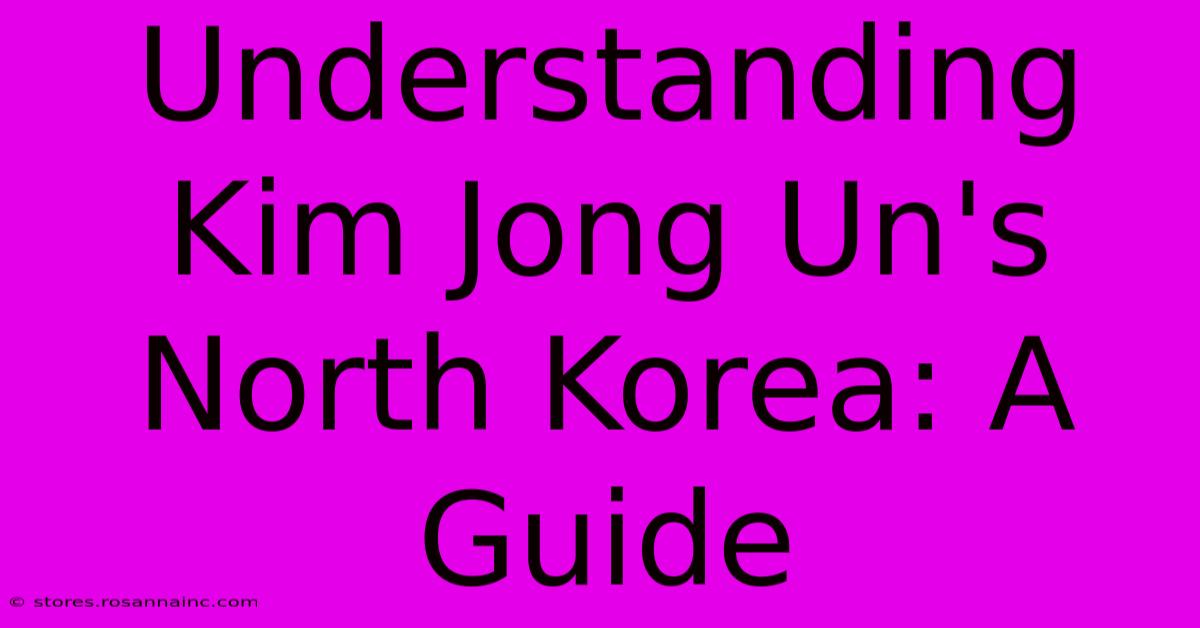Understanding Kim Jong Un's North Korea: A Guide

Table of Contents
Understanding Kim Jong Un's North Korea: A Comprehensive Guide
North Korea, officially the Democratic People's Republic of Korea (DPRK), remains one of the world's most enigmatic and isolated nations. Under the leadership of Kim Jong Un, the country's complex political system, nuclear ambitions, and human rights record continue to be major sources of international concern and intrigue. This guide provides a comprehensive overview of North Korea under Kim Jong Un, exploring its history, politics, economy, and foreign relations.
The Kim Dynasty and the Consolidation of Power
Understanding North Korea requires understanding its hereditary leadership. Kim Jong Un inherited power from his father, Kim Jong Il, who himself succeeded his father, Kim Il-sung, the founder of the DPRK. This dynastic rule has shaped the country's political landscape, fostering a personality cult around the Kim family and suppressing dissent. Kim Jong Un's rise to power wasn't guaranteed; he had to navigate complex power dynamics within the ruling elite. His consolidation of power involved eliminating potential rivals and strengthening his control over the military and security apparatus. This involved purges, executions, and a significant reshuffling of key personnel.
Key Characteristics of Kim Jong Un's Rule:
- Emphasis on Military Strength: A significant focus on military modernization and nuclear weapons development has been a defining characteristic of Kim Jong Un's reign. This is viewed both as a means of deterring external aggression and consolidating his domestic power.
- Cult of Personality: The Kim family's image is meticulously cultivated, portraying them as almost divine figures. Propaganda permeates all aspects of North Korean life, reinforcing the regime's legitimacy and control.
- Economic Policies: While initially prioritizing military spending, Kim Jong Un has also implemented some economic reforms, aiming to improve the livelihoods of certain segments of the population while maintaining tight state control. However, the North Korean economy continues to struggle, hampered by sanctions and inefficient management.
- Repressive State Apparatus: Human rights abuses are rampant, with widespread surveillance, censorship, and punishment for any perceived dissent. Freedom of speech, assembly, and religion are severely restricted. The extensive network of political prison camps (kwanliso) remains a chilling testament to the regime's brutality.
North Korea's Nuclear Program: A Source of Global Tension
North Korea's pursuit of nuclear weapons is a major source of international tension. Under Kim Jong Un, the country has significantly advanced its nuclear and missile capabilities, conducting numerous tests despite international condemnation and sanctions. This program is seen as a crucial element of the regime's survival strategy, providing a deterrent against potential external threats and bolstering Kim Jong Un's authority.
Understanding the Motivations Behind the Nuclear Program:
- Security Concerns: The regime views nuclear weapons as essential for its security, given its history of conflict and perceived threats from its neighbors and the United States.
- International Recognition: Nuclear weapons status also provides a degree of international leverage, allowing North Korea to negotiate with major powers from a position of strength.
- Domestic Legitimacy: The successful development of nuclear weapons boosts the regime's legitimacy and strengthens Kim Jong Un's image as a strong leader.
Foreign Relations and International Engagement
North Korea's foreign policy is characterized by a mix of isolationism and strategic engagement. While maintaining close ties with China and Russia, it has also engaged in periods of diplomatic outreach and confrontation with the United States and South Korea. Kim Jong Un's summits with Donald Trump, while ultimately unsuccessful in achieving denuclearization, illustrate the regime's willingness to engage in high-stakes diplomacy when it serves its interests.
Key Foreign Policy Challenges:
- Sanctions: International sanctions, imposed in response to its nuclear and missile programs, have severely hampered North Korea's economy.
- Regional Instability: North Korea's actions contribute to regional instability, particularly on the Korean Peninsula.
- Humanitarian Concerns: The regime's human rights record remains a major point of contention in international relations.
Conclusion: The Uncertain Future of North Korea
Understanding Kim Jong Un's North Korea is a complex undertaking, requiring careful consideration of its history, politics, economy, and foreign relations. The future remains uncertain, with the potential for further nuclear escalation or, conversely, a gradual opening up to the international community. However, any significant change will likely depend on a combination of internal dynamics within the North Korean regime, as well as external pressures and diplomatic initiatives. Continued monitoring and informed analysis are critical for navigating the challenges posed by this enigmatic nation.

Thank you for visiting our website wich cover about Understanding Kim Jong Un's North Korea: A Guide. We hope the information provided has been useful to you. Feel free to contact us if you have any questions or need further assistance. See you next time and dont miss to bookmark.
Featured Posts
-
India Pakistan Cricket Standings All You Need To Know
Feb 09, 2025
-
Austin Reaves 45 Points Lakers Victory
Feb 09, 2025
-
Stop Wondering Start Exploring Whats Behind The Green Door
Feb 09, 2025
-
How Old Are 2nd Graders Unveiling The Average Age Mystery
Feb 09, 2025
-
City Gagne Difficilement Face A Leyton Orient
Feb 09, 2025
